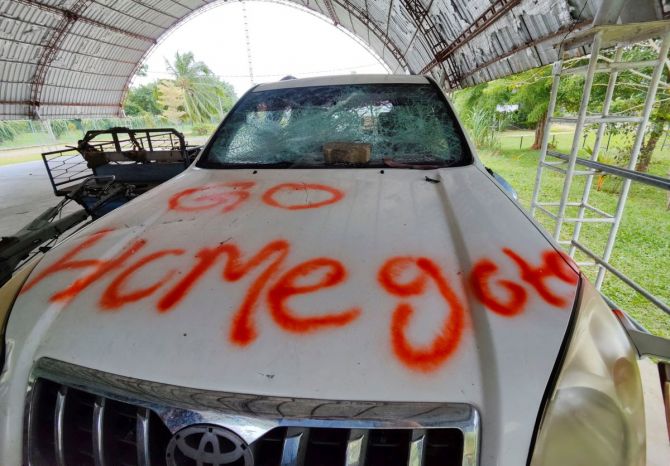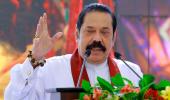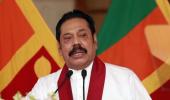Sri Lanka's embattled President Gotabaya Rajapaksa, under immense pressure from the public and the Opposition to quit over the island nation's worst economic crisis, said on Thursday that the abolition of the executive presidency, a move that will curb his powers, will be considered by Parliament.

Abolishing the presidential system of governance, in existence in the country since 1978, and replacing it with a system that reinforces constitutional democracy, has been one of the key demands of the Opposition.
In a series of tweets, the President outlined the steps to be taken to end the current political impasse after his elder brother and prime minister Mahinda Rajapaksa resigned on Monday.
'Steps will be taken to form a new gov to prevent the country falling into anarchy & to maintain the affairs of the state that have come to a halt,' Gotabaya said on Twitter.
'A PM who commands majority in Parliament & is able to secure the confidence of the people will be appointed within this week,' he said.
The new government will be given the opportunity to present a new programme and empowered to take the country forward, he said.
'Further, steps will be taken to amend the constitution to re-enact the contents of the 19th Amendment to further empower the Parliament.
'Calls from various factions for the abolition of the executive presidency will be considered. With the new government & their potential to stabilise the country, we will have an opportunity to discuss this & work towards a common consensus,' the President said in another tweet.
'I humbly request assistance in maintaining the uninterrupted function of the state machinery in order to protect the lives of the people & their property. To maintain continuous supply of essentials without allowing the country to collapse at any point in time,' he said, giving no hint that he has any plans to quit as demanded by the Opposition as well as anti-government protesters.
His tweets came after he delivered a late-night televised address to the nation in which he refused to quit but promised to appoint a new prime minister and a young Cabinet this week which would introduce key constitutional reforms to curb his powers.
Meanwhile, the President is reported to have contacted Samagi Jana Balawegaya (SJB) MP and Field Marshal Sarath Fonseka to offer premiership, the Daily Mirror newspaper reported.
Fonseka categorically denied reports that he is to accept any post in a government headed by President Gotabaya Rajapaksa, saying he will never be a partner in resolving the Rajapaksa crisis without consulting those who are protesting at 'GotaGoGama' site.
Last month, the main Opposition Samagi Jana Balavegaya (SJB) had presented a constitutional amendment bill that among other provisions cought to abolish the presidential system of governance, in existence in the country since 1978, and replace it with a system that reinforces constitutional democracy.
While the president will remain the head of state and the commander in chief, the president has no personal discretion in appointing or dismissing the prime minister, according to the proposal.
The prime minister shall be the head of the Cabinet of ministers and the ministers are to be appointed by the president on the prime minister's advice, it added.
The amendment, while seeking to annul the 20th Amendment adopted in 2020, aims to restore the 19th Amendment to the Constitution to curb the powers of the president and empower Parliament.
The 19A adopted in 2015 pruned presidential powers by empowering the 225-member Parliament above the executive president.
However, the 19A was scrapped after Gotabaya Rajapaksa won the November 2019 presidential election.
The powerful Rajapaksa family had tightened their grip on power after their massive victory in the general elections in August 2020 which allowed them to amend the Constitution to restore presidential powers and install close family members in key positions.
Mahinda, the 76-year-old Sri Lanka People's Party (SLPP) leader known for his brutal military campaign against the Liberation Tigers of Tamil Eelam (LTTE) during his presidency from 2005 to 2015, resigned on Monday.
He is being protected at the Trincomalee naval base after he was evacuated from his official residence, Defence Secretary Gen (retd) Kamal Guneratne said on Wednesday.
Mahinda, who served as the country's prime minister thrice, saw his private residence set on fire on Monday.
He, along with his wife and family, fled his official residence -- Temple Trees -- and took shelter at the naval base in Trincomalee after a series of deadly attacks on his supporters.
A curfew is in force across the island nation after mobs burned down the ancestral home belonging to the ruling Rajapaksa family amid mounting anger for their mishandling of the economy, leading to the island nation's worst economic crisis.
Over 250 people were injured in the clashes which also saw scores of properties belonging to ruling party politicians being set on fire.
Sri Lanka is facing its worst economic crisis since gaining independence from Britain in 1948.
The crisis is caused in part by a lack of foreign currency, which has meant that the country cannot afford to pay for imports of staple foods and fuel, leading to acute shortages and very high prices.
Thousands of demonstrators have hit the streets across Sri Lanka since April 9 seeking the resignation of the Rajapaksa brothers.
The powerful Rajapaksa clan has dominated Sri Lankan politics for years.
Gotabaya is the last Rajapaksa family member in office and the resignation of his brother as prime minister did nothing to placate demonstrators or bring calm in the island nation.
Meanwhile, the nationwide curfew that was imposed following the violent incidents was lifted on Thursday at 7 am for seven hours and will be reimposed at 2 pm, the President's Office announced.
Curfew will thereafter be in effect until 6 am on Friday.











 © 2025
© 2025